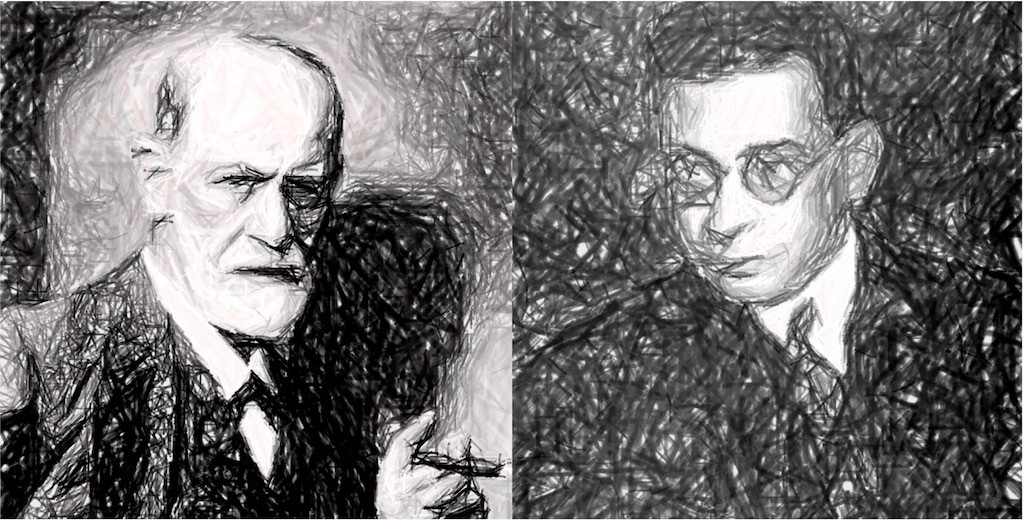Rank Horror Symposium
 Sigmund Freud and Otto Rank, image by Nathan Gorelick
Sigmund Freud and Otto Rank, image by Nathan Gorelick
2024 marks one hundred years since the initial publication of Otto Rank’s The Trauma of Birth, the first major work from within Freud’s inner circle to foreground the maternal body’s importance to primordial anxiety and unconscious fantasy.
The Otto Rank papers housed in Columbia's Rare Book & Manuscript Library is the premier documentary resource related to Rank's life and work.
On May 9-10, join us for two full-days of talks.
This event is free and open to the public. Sponsored by the Rare Book & Manuscript Library, the Columbia Center for Psychoanalytic Training & Research, and the Barnard College English Department.
Symposium: Thursday, May 9-Friday, May 10
2024 marks one hundred years since the initial publication of Otto Rank’s The Trauma of Birth. This was the first major psychoanalytic work from within Freud’s inner circle to foreground the maternal body and threaten the primacy of the Oedipus complex, and it provoked Rank’s unwilling ejection from the International Psychoanalytic Association. The break was painful and deeply personal for all involved, but The Trauma of Birth was nevertheless fundamental to many later threads of psychoanalytic inquiry and practice, even or especially where Rank’s legacy remains hidden.
It is therefore fitting that Rank is remembered today as a key inspiration behind “The Uncanny,” one of Freud’s most influential and widely read texts. “The Uncanny” is an unmatched thesis on the psychology of pleasurable unease, the haunting effects and affects of a past that refuses to remain buried, and the strange terror of the unconscious. Yet, for all its ranging interest, the anxiety surrounding the maternal body is conspicuously absent.
Here at the centennial anniversary of Rank’s most daring and controversial text, we return to The Trauma of Birth to consider how Rank’s contributions to psychoanalysis still crawl uncannily through the conceptual forest of the familiar. What of his thought and clinical practice originates from but cannot be absorbed by the Freudian field? How does Rank thereby haunt, disturb, or unnerve the history of the unconscious? And what can psychoanalysis do with—or against—Rank and his legacy today to help us better imagine, conceptualize, or resist the many horrors, fictional or factual, traversing our present?
Under the general heading of “Rank Horror,” clinicians and cultural critics will together consider these or any related questions concerning the specter of Otto Rank within and beyond psychoanalysis. Participants will speak from a variety of clinical orientations and academic disciplines, and will be joined by artists, filmmakers, and students from across the humanities.
Send inquiries to Prof. Nathan Gorelick, English Department, Barnard College, ngorelick@barnard.edu
Register today! https://events.columbia.edu/go/rankhorror
Thursday, May 9, 9:15AM to 3PM
PETERSON HOUSE, 16 WEST 10TH STREET, NEW YORK, NY 10011
9:30 – 10:45
Nathan Gorelick
“Parricidal Tendencies: Uncanny Inheritance between Rank and Freud”
10:45 - 11:00
Break
11:00 -12:15
Fernanda Negrete
“Dora’s and Adelaide’s Dissidances: Horrors and Powers of the Feminine”
Introduction by Melissa Wright
12:15-1:45
Lunch (on site for participants)
1:45 - 3:00
Seth Brodsky
“Handwringing, or Classical Music’s Doppelgänger Problem”
Introduction by Ben Kafka
Friday, May 10, 10:00AM to 5PM
10:00-11:15
Leon Brenner
“The Return of the Mother-Tongue: The Body of Language in Rank and Lacan
Introduction by Mark Pingree
11:15 – 11:30
Break
11:30-12:45
Boštjan Nedoh
“The Birth of Trauma: Rank, Freud, Lacan”
Introduction by Russell Sbriglia
12:45-2:30
Lunch (on site for participants)
2:30-3:45
Steven Miller
“On the Notion of ‘Analytic Experience’”
Introduction by Andrew Ragni
3:45 – 4:00
Break
4:00-5:15
Jamieson Webster
“First Breaths: The Psycho-Physical Knot of the Unconscious”
Introduction by Gila Ashtor